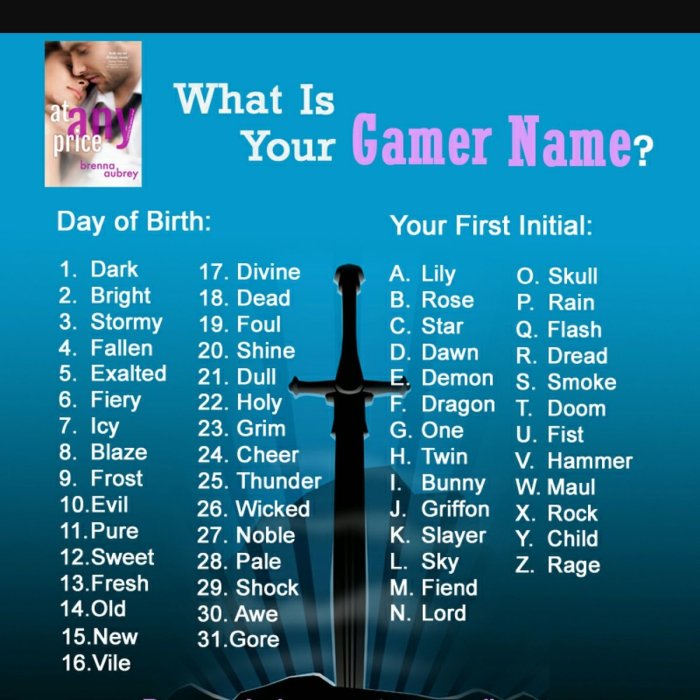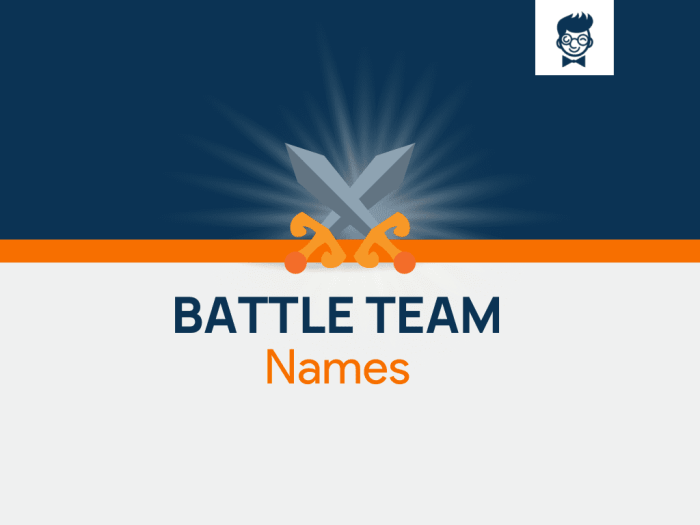Battle names for games – In the realm of gaming, battle names hold a unique power to ignite imagination and set the stage for unforgettable encounters. From historical clashes to mythical skirmishes, the names we bestow upon these pivotal moments shape the narrative and immerse players in the game’s universe.
This guide delves into the art of crafting battle names that resonate, inspire, and leave a lasting impression.
Battle Names for Games
In the world of gaming, battles are an integral part of the experience. And with battles comes the need for unique and engaging names. Whether you’re a game developer looking to create memorable battles or a player seeking inspiration for your own character, this article will provide you with insights into the various techniques and considerations involved in crafting effective battle names.
1. Battle Name Generation Techniques

There are two primary methods for generating battle names: using AI or random generators and brainstorming manually.
AI or Random Generators
AI-powered name generators can quickly create a vast number of battle names based on specific criteria. They analyze existing battle names and identify patterns, allowing them to generate unique and contextually relevant names. Random generators, on the other hand, produce random combinations of letters and syllables, resulting in more abstract and unpredictable names.
Advantages:
- Speed and efficiency: AI and random generators can generate numerous names in a short amount of time.
- Variety: These tools can produce a wide range of names, from common to rare and unusual.
Disadvantages:
- Lack of control: AI and random generators may not always produce names that align with your specific requirements or preferences.
- Potential for repetition: AI generators may generate similar names if the training data is limited.
Manual Brainstorming
Manual brainstorming involves coming up with battle names through creative thinking and research. This method allows for greater control over the naming process and can result in more meaningful and memorable names.
Advantages:
- Customization: Manual brainstorming enables you to tailor the names to your specific needs and preferences.
- Meaningful names: By researching historical events, cultural influences, and mythological references, you can create names that carry significance and depth.
Disadvantages:
- Time-consuming: Manual brainstorming can be a lengthy process, especially if you require a large number of names.
- Limited variety: The number of names you can generate through manual brainstorming may be limited compared to AI or random generators.
2. Historical Inspiration for Battle Names

History provides a rich source of inspiration for battle names. Many games draw upon historical battles, figures, and locations to create names that evoke a sense of authenticity and grandeur.
Examples:
- The Battle of Marathon in the game “Assassin’s Creed: Odyssey”
- The Battle of Agincourt in the game “Total War: Medieval II”
- The Battle of Thermopylae in the game “300: Rise of an Empire”
When using historical inspiration, it’s important to consider the historical accuracy of the names. Using names that are historically inaccurate can detract from the authenticity of the game experience.
3. Cultural and Mythological Influences
Cultures and mythologies from around the world offer a diverse range of inspiration for battle names. These names can reflect the beliefs, legends, and deities of different cultures, adding depth and richness to the game world.
Examples:
- The Valkyrie, a mythical female warrior from Norse mythology, used in the game “Valkyrie Profile”
- The Kraken, a giant sea monster from Scandinavian folklore, used in the game “God of War”
- The Anubis, the Egyptian god of death, used in the game “Smite”
When using cultural or mythological influences, it’s important to be respectful of the source material and avoid cultural appropriation.
4. Thematic Considerations: Battle Names For Games

The overall theme of the game can play a significant role in the naming of battles. Battles in a fantasy game, for example, may have names that reflect the magical or mythical nature of the setting.
Examples:
- “The Battle of the Frozen Wastes” in the game “Game of Thrones: Conquest”
- “The Battle of the Shadowlands” in the game “World of Warcraft”
- “The Battle of the Nexus” in the game “Heroes of the Storm”
By aligning the battle names with the game’s theme, you can create a more immersive and cohesive experience for players.
FAQ Overview
What are the key factors to consider when creating battle names?
Originality, accessibility, visual impact, and relevance to the game’s setting and narrative are crucial factors to keep in mind.
How can historical events influence battle names?
Historical battles, figures, and locations can provide rich inspiration for battle names, lending authenticity and depth to the game’s narrative.
What role do cultural and mythological influences play in battle naming?
Cultural beliefs, legends, and deities can shape the naming conventions of battles, adding layers of meaning and resonance for players.
